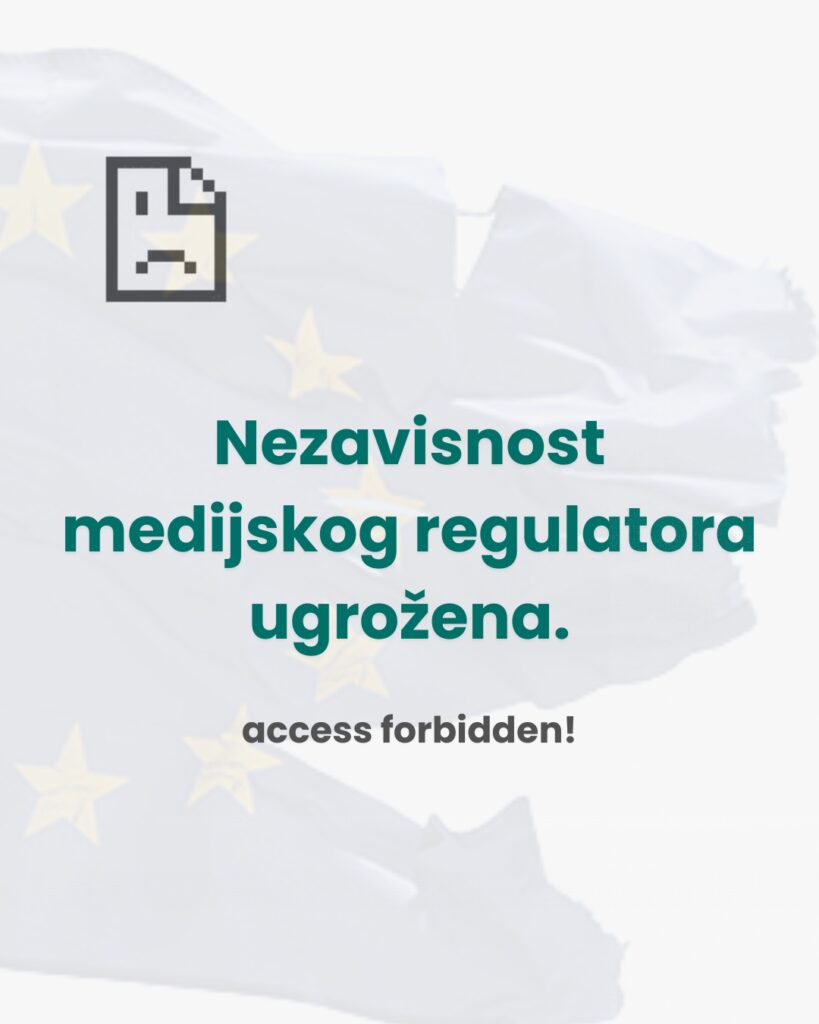Yesterday’s vote in the Parliament of Montenegro on the appointment of members to the Council of the Agency for Audiovisual Media Services revealed the true nature of the ruling majority’s actions – the systemic dismantling of European integration efforts and the imposition of party control over institutions that, under EU rules, must be independent and professional.
Instead of respecting the law and European standards, the parliamentary majority once again demonstrated its openness to erode the institutional framework for the sake of narrow party interests. This continues a series of obstructions that began in June of last year, marked by two unlawful and senseless annulments of public calls for Council member appointments, as well as a recent consultative hearing of AVMU Council candidates that is not part of the legally prescribed procedure.
Although the Administrative Committee confirmed that both candidates – Dragoljub Duško Vuković, representing the NGO sector, and Niko Martinović, representing CANU – met all legal criteria, the parliamentary majority refused to confirm them. As a result, the appointment process has been reset for the third time, disregarding clear messages from EU institutions.

In the meantime, the Agency is operating with only three out of five Council members, seriously compromising its ability to function, especially when making decisions in second-instance procedures, which require all three members to be present and to vote unanimously. The ruling majority has, deliberately and in violation of the law, left the Agency teetering on the edge of quorum to keep it in a state of paralysis, at a time when Montenegro is facing serious foreign disinformation campaigns aimed at halting its EU integration and weakening its NATO position. An independent regulator, especially in such a context, must not be held hostage to party calculations.
Full responsibility for obstructing the implementation of the Law on Audiovisual Media Services and the work of the media regulator lies with the leaders of the parliamentary majority: Milojko Spajić, Andrija Mandić, Milan Knežević, Aleksa Bečić, Ervin Ibrahimović, Nik Đeljošaj, and Vladimir Joković.
The rejection of candidates from the NGO sector and CANU, solely due to their professional independence, directly damages Montenegro’s credibility in its negotiations with the EU. It raises doubts about the provisional closure of Chapter 10 (Information Society and Media) and the possibility of its re-opening. We remind that the adoption and implementation of media laws, particularly the Law on Audiovisual Media Services, was a key condition for receiving a positive IBAR.
By blocking its implementation, the parliamentary majority is sending a message that EU rules apply only when convenient. This is not about a single law – it is a test of the maturity of decision-makers, and they are failing it.
The goal is clear – to minimize the role of an independent regulator and exclude civil society from the democratization of the media system.
We remind the ruling majority that these methods are neither new nor original – the DPS did the same in the past, the very party they claimed to oppose for abusing power. But once in office, their perspective shifted, and they quickly adopted the worst practices.
The citizens of Montenegro deserve professional institutions, not party branches that shift with the electoral winds, where professionalism is treated as a threat, and party loyalty as the only acceptable qualification.
Non-governmental organizations announce today that Dragoljub Duško Vuković will remain the candidate in the upcoming fourth public call. We will not allow political parties to decide who represents the civil sector in institutions that must remain independent.
- Goran Đurović, Media Centre
- Olivera Nikolić, Montenegrin Media Institute (MMI)
- Daliborka Uljarević, Centre for Civic Education (CCE)
- Milka Tadić Mijović, Centre for Investigative Journalism (CIN-CG)
- Tea Gorjanc Prelević, Human Rights Action (HRA)
- Mila Radulović, Association of Professional Journalists of Montenegro
- Vuk Maraš, BIRN
- Radomir Kračković, Media Trade Union of Montenegro
- Aida Perović, NGO Prima
- Mustafa Canka, NGO “Ul Info”
- Zdravko Janjušević, Bijelo Polje Democratic Centre
- Željko Đukić, NGO Multimedial Montenegro
- Nataša Nelević, NOVA – Centre for Feminist Culture
- Slavica Striković, NGO Women’s Action
- Nevenka Vuksanović, Centre for Democracy and Human Rights (CEDEM)
- Zlatko Vujović, Centre for Monitoring and Research (CeMI)
- Jovan Ulićević, Association SPEKTRA
- Maja Raičević, Centre for Women’s Rights
- Fana Delija, Centre for Roma Initiatives
- Biljana Zeković, SOS Hotline for Women and Children Victims of Violence Podgorica
- Hatidže Neljaj, SOS Hotline for Women and Children Victims of Violence Ulcinj
- Marina Vuksanović, NGO Nada, Herceg Novi
- Aleksandar Jerotić, NGO Pandora
- Nazif Velić, New Horizons
- Duško Marković, Media Team
- Musluć Muamera, NGO Đakomo Adriatic
- Boris Nedović, NVU Centre of the North
- Radomir Petrić, NVU Sua Sponte Bar
- Zorana Marković, Centre for Development of NGOs (CRNVO)
- Marija Kalezić, Centre for Civil Liberties (CEGAS)
- Staša Baštrica, Montenegrin LGBTIQ Association – Queer Montenegro
- Mikan Medenica, NGO Natura
- Mirsala Tomić, Association for Civil Society Development
